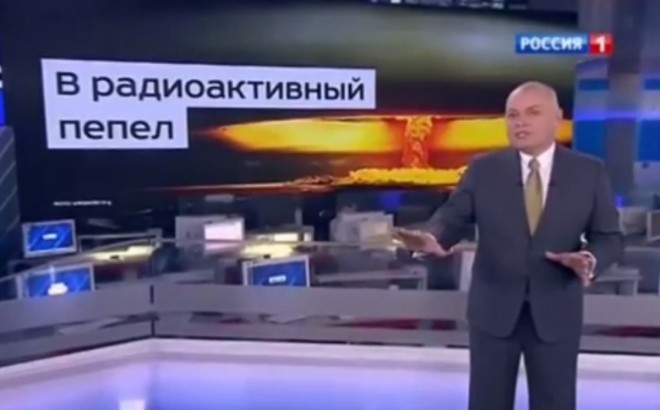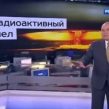
Revisionist Radicals Accuse Putin of Being Too Soft on Ukraine, as Russia Takes on Status of Pariah State
Publication: Eurasia Daily Monitor Volume: 11 Issue: 58
By:

President Vladimir Putin’s approval rating has reached a staggering 82.3 percent, the Kremlin-controlled pollster VTsIOM reported this week (March 27). Last January, the same polling outfit reported Putin’s rating at 60.6 percent. The almost bloodless capture and swift annexation of Crimea has been boosting Putin’s approval rating growth, as the vast majority of Russian’s believe the Kremlin is taking back what always rightfully belonged to Russia. As Putin’s popularity skyrockets, the Russian press is eager to report President Barack Obama’s approval rating falling to 39 percent, with the US President’s foreign policy being particularly unpopular (https://www.gazeta.ru/politics/news/2014/03/27/n_6041609.shtml). Another Kremlin-financed pollster, FOM, reported this week that 60 percent of Russians agree relations with the United States have worsened in the last year and 71 percent believe the US casts a negative influence on the entire world (https://www.rg.ru/2014/03/26/roli-site-anons.html).
According to Lev Gudkov, the director of the independent pollster Levada Center, up to the middle of last February, a majority of Russians (65–75 percent) believed the political upheaval and mass protests in Kyiv against President Viktor Yanukovych’s regime were an internal Ukrainian problem and that Russia must keep its distance and “stay out.” the situation drastically changed in mid-February as the Russian media, led by Kremlin-controlled TV, began a vicious mass propaganda campaign to brainwash the Russian population into believing: Russians in Ukraine are threatened, their survival is at stake, and “we must defend our own.” The anti-Yanukovych protesters were denounced as “bandits” and extreme nationalistic “fascists,” bent on wiping out Russians and Jews in Ukraine. The country itself was portrayed as a failed state in total chaos, with no legitimate government. A Russian intervention seemed to be an urgent necessity. Gudkov states he had never observed, even in Soviet times, “a propaganda campaign of such intensity, aggressiveness and dishonesty” (https://www.novayagazeta.ru/politics/62711.html).
No alternative or dissenting voices have been allowed on Russian federal TV channels, which do not air any live, unedited programs or panel discussions. According to Gudkov, some 70 percent of Russians say they do not understand the essence of what is happening in Ukraine, but at the same time 63 percent say the federal television channels truthfully report on Ukrainian events. Over 90 percent agree with the annexation of Crimea “because it is our land that was given to Ukraine by mistake.” Over 75 percent believe other Ukrainian territories in the south and east are also “Russian land” and Moscow has a right to move in troops “to protect them.” This propaganda onslaught has effectively mobilized and consolidated the Russian public on the basis of aggressive xenophobia, but Gudkov hopes this hysterical consolidation may begin to crumble in several months (https://www.novayagazeta.ru/politics/62711.html).
According to opposition politician and former first deputy Duma speaker Vladimir Ryzhkov, the Russian population is being deliberately brainwashed by a professionally organized “military propaganda campaign,” to create “military hysteria” and massive popular support for war and the invasion of Ukraine. According to Ryzhkov, the utilization by the Kremlin of specific military propaganda techniques indicates “actual war is much closer in time and much more probable than we may imagine” (https://www.echo.msk.ru/blog/rizhkov/1286532-echo/).
In the annexation of Crimea, the continuing Ukrainian crisis, and the developing rift with the West, Putin is utilizing the support and promoting the agenda of “Soviet revisionists” that hope to reinstate the great Soviet Union, which collapsed in 1991, by taking over Ukraine, Transnistria, Moldova and so on. The Soviet revisionist agenda does not end in Crimea, and Putin’s freedom of maneuver may be restricted by the revisionist forces he has unleashed, if the Kremlin decides at some point to slow down the “reunification process” (https://www.ng.ru/editorial/2014-03-18/2_red.html). Putin has already been accused of being too soft. After the Federation Council (upper chamber of the Russian parliament) on March 1 authorized the deployment of Russian troops on Ukrainian soil, the Kremlin could have begun a surprise massive invasion not only in Crimea, but over the entire border. The West would have been caught off guard, while the east and south of Ukraine were taken. But the Kremlin faltered, a massive invasion was called off, and now the risk of practically all of Ukraine becoming pro-Western is high: “[Russia] acquired Crimea, but lost the rest of Ukraine,” critics allege (https://www.vpk-news.ru/articles/19630).
According to the Ukrainian border guard service, Russian troops are poised ready to go and are constantly maneuvering close to the Ukrainian border (https://www.ukrinform.ua/rus/news/rossiya_prodolgaet_styagivat_voyska_k_granitse_s_ukrainoy___litvin_1616693). More battle-ready army brigades may be swiftly moved to the front from the Russian interior via railroad, while the paratrooper forces (VDV) could attack and capture strategic targets deep within Ukraine, using transport air force capabilities (VTA). The West has threatened punitive sanctions, if Russia escalates the present standoff with Ukraine, but official Russian propaganda has been disregarding this threat as phony. In a latest poll, 64–74 percent of Russians expressed confidence the state will provide them with enough food and other essentials if the United States and the European Union impose punitive sanctions (https://www.interfax.ru/print.asp?sec=1448&id=367669).
The results of a recent poll by FOM shows that 72 percent of Russians believe it is ethical for journalists to withhold important information, if state interests are involved, and 54 percent believe journalists may lie and distort information to promote important state interests. Some 54 percent of Russians believe “the professional level of reporting has risen recently” (https://fom.ru/SMI-i-internet/11428). A decision has been made in the Russian parliament to withdraw from the Parliamentary Assembly of the Council of Europe (PACE), if at a session that begins on April 7, in Strasburg, Russia is somehow censured or excluded from the assembly for annexing Crimea and threatening the rest of Ukraine. “We will not sit and passively listen as we are slandered—we will leave on our own,” a government source told journalists in Moscow (https://www.kommersant.ru/doc/2438682). The Russian ruling class and a large portion of Russia’s population seem to be readily rejecting the West and its basic principles. In fact, Russia seems to be welcoming international pariah status, if that is the price to pay for restoring its former greatness and taking back by force territory and populations that are deemed “ours.”
–Pavel Felgenhauer
Armed Rebels Remain Moscow’s Biggest Problem in Ingushetia
The leadership of Ingushetia is being forced to follow the orders of Kremlin strategists, which define how the situation will evolve in this, the smallest republic in the Russian Federation. Arguably, the most important problem for Moscow in Ingushetia is the armed underground jamaat in the republic, where insurgency-related violence has claimed hundreds of victims over the past four years, putting Ingushetia fourth out of the seven republics of the North Caucasus in terms of casualties, behind Chechnya, Dagestan and Kabardino-Balkaria (https://www.kavkaz-uzel.ru/articles/239812/). However, Ingushetia’s small population meant that the ratio of victims to population there was far higher than in the other republics. Moreover, the reprisals against those who were suspected of involvement in the armed resistance in Ingushetia were crueler than elsewhere in the region (https://ingushetia.kavkaz-uzel.ru/articles/239836/).
The methods of intimidating the rebels in Ingushetia include pressuring relatives and family members of the suspects. For example, on March 15, the house of Bagautdin Yevloev in the village of Sagopshi in Ingushetia’s Malgobek district was surrounded and blown up (https://www.youtube.com/watch?v=2TDl5ajTTIw).
Yevloev had served in the Ministry of Interior for 33 years and was deputy chief of the Criminal Investigation Department when he left the service. However, his police veteran’s ID did not save the house of his son, who is suspected of ties to the leader of Ingushetia’s jamaat, Artur Getagazhev (a.k.a. Emir Abdula) (https://www.habar.org/?paged=3). The former police officer also was forced to make a statement that he had no complaints about the actions of those who had exploded his house (https://ingushetia.kavkaz-uzel.ru/articles/239794/).
That same day, a resident of the city of Malgobek, Bekhan Bayaliev, was arrested on suspicion of ties to the insurgency. The procedure of the arrest was typical for the Russian law enforcement agencies—there was a search, during which family members were prevented from entering one of the rooms, after which ammunition was “found” and one of the family members was arrested. Ingush rights activist Magomed Mutsolgov reported on this incident in his online blog (https://www.kavkaz-uzel.ru/blogs/342/posts/17424).
On March 22, two young people were killed in a special police operation in the village of Plievo in Ingushetia’s Nazran district. A law enforcement source said the two, Bashir Dishaev and Muslim Kuriev, were killed when the police tried to arrest them. According to the police, Dishaev detonated his own improvised explosive device (IED) and Kuriev was killed when he tried to resist the police (https://ingushetia.kavkaz-uzel.ru/articles/239871/). Neither of the slain individuals was on republican or national wanted lists (https://06.mvd.ru/dlya_grajdan/rozisk/podozrevaemie/letter/5).
The police first killed Kuriev. According to some eyewitness testimony, he was killed while in bed sleeping. Dishaev was killed in a house on the same street where Kuriev was killed (https://www.habar.org/?p=29351#more-29351).
Contrary to witness accounts, police websites reported that there was even an armed clash between the police and the suspects. Automatic rifles were found on the site of the clash. During a search, the police allegedly found three IEDs that could not be defused, so security service sappers had to detonate them. The combined power of the IEDs was around 30 kilograms of TNT, according to police (https://kavkazpress.ru/archives/43768). The house was destroyed by the explosion (https://kavkazcenter.com/russ/content/2014/03/22/103670.shtml).
The account by the authorities does not look plausible. It is unclear, for example, why the police did not summon the suspects for interrogation. The two young people lived in the village and did not arouse any suspicions. The only suspicious behavior they displayed was that they both attended a mosque, especially for morning prayers. So, the Russian security services certainly had some doubts about these young men. Moreover, Dishaev was respected by the old men and they asked him to do azan (the Muslim call to prayer). These combined circumstances probably led to the tragedy for the two young people.
The authorities admitted that one of the servicemen involved in the operation was injured, but provided no details (https://newsru.com/russia/22mar2014/ingush.html). The republic’s official website (https://www.ingushetia.ru/m-news/archives/month_2014_03.shtml) does not provide even a hint about counter-terrorist operations. A visitor to the website would not even suspect that such events happen nearly every week. This deception in the virtual world of the Internet is designed to improve the image of the republic against the backdrop of the republican leadership’s inability to attract any tourists to the recently constructed resort in Armkhi (https://evkurov.livejournal.com/142873.html). However, it is unlikely potential tourists will make their decisions based on the official government websites, especially given the situation with the insurgents is so unpredictable.
Meanwhile, the website of the Ingush militants published a statement by the leadership of the republic’s jamaat recognizing Ali Abu Muhammad (Kebekov) as the new leader of the Caucasus Emirate and swearing allegiance to him (https://hunafa.com/?p=17132). The Kabardino-Balkarian jamaat did the same as well (https://www.islamdin.info/2014/03/blog-post_21.html). The Dagestani jamaats also recognized the new leader, but the Chechen jamaat has not done so officially yet, but certainly will do so. This will remove concerns about the Caucasus Emirate’s vertical and horizontal links. There is, however, another issue that is emerging and this is the Chechen jamaat is disappearing in Chechnya itself, and this may result in the disintegration of all structures of the armed resistance of the North Caucasus in the future.
The confrontation between the authorities in Ingushetia and the Ingush jamaat, which has been regrouping since last summer, remains dangerous. As of now, there is no reason to conclude that the situation has radically shifted in favor of the authorities, as happened in the past with the Karachay and the Nogai steppe jamaats.




